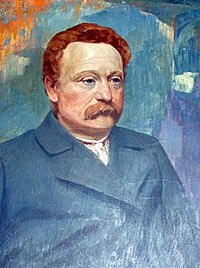Ivan Franko
Franko was born in the Ukrainian village of Nahuievychi,[2] then located in the Austrian kronland of Galicia, today part of Drohobych Raion, Lviv Oblast, Ukraine.
As a child, he was baptized as Ivan by Father Yosyp Levytsky, known as a poet and the author of the first Galician-Ruthenian Hramatyka ("Grammar"), who was later exiled to Nahuyevychi for a "sharp tongue".
[5] That statement is also supported by Timothy Snyder who describes Yakiv Franko as a village blacksmith of German Roman Catholic descent.
In 1875, he graduated from the Drohobych Realschule, and continued on to Lviv University, where he studied classical philosophy, Ukrainian language and literature.
It was at this university that Franko began his literary career, with various works of poetry and his novel Petriï i Dovbushchuky published by the students' magazine Druh (Friend), whose editorial board he would later join.
After release, he studied the works of Karl Marx and Friedrich Engels, contributed articles to the Polish newspaper Praca (Labor) and helped organize workers' groups in Lviv.
Franko published a series of books called Dribna Biblioteka ("Petty Library") from 1878 until his second arrest for arousing the peasants to civil disobedience in 1880.
Later that year, Franko moved to his native Nahuievychi, where he wrote the novel Zakhar Berkut, translated Goethe's Faust and Heine's poem Deutschland: ein Wintermärchen into Ukrainian.
He also wrote a series of articles on Taras Shevchenko, and reviewed the collection Khutorna Poeziya (Khutir Poetry) by Panteleimon Kulish.
Franko worked for the journal Zorya (Sunrise), and became a member of the editing board of the newspaper Dilo (Action) a year later.
Franko married Olha Khoruzhynska from Kyiv in May 1886, to whom he dedicated the collection Z vershyn i nyzyn (From Tops and Bottoms), a book of poetry and verse.
The couple lived in Vienna for some time, where Ivano Franko met with Theodor Herzl and Tomáš Garrigue Masaryk.
He continued his anti-Marxist stance in a collection of poetry entitled Mii smarahd (My Emerald) in 1898, where he called Marxism "a religion founded on dogmas of hatred and class struggle".
[citation needed] His long-time collaborative association with Mykhailo Drahomanov was strained due to their diverging views on socialism and the national question.
In the last nine years of his life, Franko seldom physically wrote, as he suffered from rheumatism which eventually paralyzed his right arm.
In 1916, Josef Zastyretz and Harald Hjärne proposed Franko for the 1916 Nobel Prize in Literature, but he died before the nomination materialized.
Olha Fedorivna Khoruzhynska (m. 1886-1941), a graduate of the Institute of Noble Dames in Kharkiv and later the two-year higher courses in Kyiv, she knew several languages and played piano, died in 1941 According to Roland Franko, his grandfather was 1.74 metres (5.7 ft) tall, had red hair, always wore mustache and the Ukrainian embroidered shirt (vyshyvanka) even with a dress-coat.
His grand-nephew, Yuri Shymko, is a Canadian politician and human rights activist living in Toronto, who was elected to Canada's Parliament as well as the Ontario Legislature during the 1980s.
His works deal with Ukrainian nationalism and history (Zakhar Berkut, 1883), social issues (Basis of Society, 1895 and Withered Leaves, 1896), and philosophy (Semper Tiro, 1906).
On the Centennial of Franko's PhD defence in 1993, the then Austrian vice chancellor Erhard Busek had a commemorative bust installed in the university building on Ringstrasse, opposite Übungsraum 1 and 2 at the Department of Germanistik.
Franko's consciousness had been bold, and on the level playing ground of the new world, it served Ukrainians in Canada to find their own identity as Ukrainian-Canadians.





